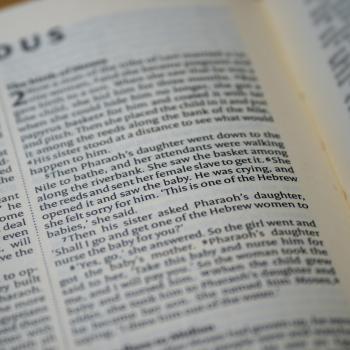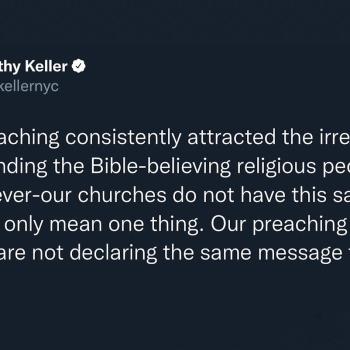A number of years ago, I wrote a blog post asking Andy Stanley to step down from ministry. The reason for this was fairly straightforward, in that while he would not deny the virgin birth, he made statements suggesting that the Christian faith doesn’t hinge off of the account of the virgin birth. This is false.
Later on, Andy Stanley also made comments that earned him the spurn of many Evangelicals, suggesting that it was time to unhitch from the Old Testament. In essence, his intent here was to say, that in much the same way the Christian faith doesn’t hinge off of the virgin birth, the Christian faith likewise doesn’t hinge off of the Old Testament.
In light of this, Andy Stanley suggested that things like miraculous phenomena, the historicity of Adam and Eve, etc., are all negotiable tenets of the Christian faith—that if these things are your hang up—focus instead on Jesus’ life, death, and resurrection, for this is the core of the Christian faith. Though he again made it clear that he doesn’t deny the aforementioned hang-ups, he nonetheless suggested one “unhitch” themselves from these things and instead “hitch” themselves on Jesus.
I wrote another blog post to address this issue at length, as it is also false. Suffice it to say, we simply never find that kind of luxury within the corpus of Scripture, as Jesus Himself was content to uphold these things as literal truths. Had Andy Stanley suggested one need not figure all of these things out prior to wrestling with who Jesus is, I think most people would naturally agree. The gospel, that is, the life, death, burial, and resurrection of Jesus Christ, undoubtedly takes precedence in how we evangelize. But that’s not what Andy Stanley implied in his words.
It should be noted that one of the points of the Great Commission is that we teach others to obey everything Christ has commanded us (Matt. 28:20). God has inspired all of Scripture, for the very purpose made clear by Christ in issuing the Great Commission (2 Tim. 3:16-17). It is in light of the fact that Scripture is God-breathed, or literally expressed, from the Spirit of God Himself, that the man of God may be equipped to teach, rebuke, correct, and train others in righteousness. This command to make disciples then encompasses the twofold reality of both teaching and obedience to that teaching, which the apostle Paul picks up broadly elsewhere in referring to the faith (Rom. 1:5; 1 Cor. 16:13; Eph. 4:13; Col. 1:23).
The faith here is not that personal, subjective knowledge and application of the gospel (i.e., your faith), it is instead, that collective body of truth, from Genesis to Revelation, which was once for all handed down to the saints (Jd. 1:3). It is this same body of truth that Jude commands the church to agonize over—to not merely defend, but to go on the offensive, to protect, guard, and even conquer the lies of this age with (Col. 4:6; 1 Pet. 3:15). The simple point being that we are not at liberty to flippantly suggest one can “unhitch” themselves from any portion of Scripture. It is all authoritative and binding upon every man, woman, and child, for it is God Himself who gave us this Word (2 Pet. 1:21).
Again, Andy Stanley claims to affirm biblical inerrancy and authority, yet his own words suggest otherwise. Not long after he suggested people “unhitch” from the Old Testament, he provided this blog post, where he then suggested a form of Marcionism, further divorcing the Old Testament from the New Testament. I wrote yet another blog post here to draw out why his teachings were actually heretical, but in a nutshell, he amped up his “unhitch from the Old Testament” language to a more broadly defined “red-letters” kind of Christianity, where the ethos and teaching of Christ is indirectly insinuated to contradict the rest of Scripture.
Why then do I write this blog post?
In a sermon on Luke 1:1-4 dated March 6, 2022, the following opening statement was made by Andy Stanley:
“The Christian faith doesn’t rise and fall on the accuracy [or the inerrancy] of 66 ancient documents [or books we call the Bible]. It rises and falls on the identity of a single individual: Jesus of Nazareth” (brackets include fuller quote to what was seen on social media).
I’d encourage you to watch the full sermon starting at about the 26 minute mark in the service. It will not only provide fuller context to his statements but will actually demonstrate quite clearly that people’s objections to Andy Stanley are entirely founded.
There are a number of points he makes throughout the sermon that I believe most would affirm:
- Jesus is the reason for the Bible. Without the life, death, burial, and resurrection of Christ, we would have no Bible (my note: perhaps it is better stated we would have no New Testament).
- Luke wrote an incredibly detailed account of eye-witness testimony to the story of Jesus.
- Saints have died to preserve this sacred literature we know as the Bible.
- The writings placed in the Bible were recognized as true and trustworthy when they were originally written.
- There is undoubtedly a high cost to following Jesus. We are to count that cost.
In spite of these things, there are a number of things Andy Stanley stated which are, frankly speaking, contrary to everything I just recorded above. Those with quotations below are direct quotes from the sermon.
- “The question to ask is if Matthew, Mark, Luke, or—not and—or John, are a reliable account of actual events. If they are, then game on. Faith on.”
- What matters in the end is what we make of the story and person of Jesus, especially in the resurrection, not that the Bible claims these things happened.
- The basis of our faith is not in “the Bible tells me so,” but in the event that took place (i.e., the resurrection).
- If you decide not to follow Christ because the cost is too high for you, this is a somewhat valid reason to not follow Him (paraphrased). “If you choose to follow Jesus—it will eventually make your life better and it will make you better at life, that’s a guarantee. The only good reason not to follow Jesus isn’t that the Bible isn’t true, it’s that you decide that Luke isn’t trustworthy.”
- “What’s your initial response to the suggestion that the Christian faith rises or falls on the reliability of the Gospels rather than the reliability of the entire Bible? This distinction understandably makes some Christians nervous, but it is the church’s fault. And I’m convinced that this distinction might actually be the key to recapturing and safeguarding the faith of this and the next generation.”
This is the first of a series Andy Stanley will be preaching, so I will only take into account what he’s said thus far in this post. However, I believe that it is clear, especially given his previous statements, where his trajectory is going.
He seems to be placing primary currency on the gospel of Luke, given this is the book he’s chosen for this series and his remarks above. In that, he signals a key conjunction when he refers to all of the gospels. Note again, Andy Stanley said, “The question to ask is if Matthew, Mark, Luke, or—not and—or John, are a reliable account of actual events.” The deliberate choice of the word “or” is not incidental or a misspoken word, and we see this from the remainder of his thesis, which is just a rehashing of his previous teachings on this matter.
The crux of the issue for Andy Stanley is clearly what we make of the resurrection—what he refers to as “the event.” In this, it is quite clear he’s suggesting that without the resurrection, there is no Christian faith, to which all of God’s people would say, “Amen.” Where he takes this line of reasoning though is spurious at best, as all throughout his sermon he places a divide between the Word of God and the actual moments in time and space where these things took place. In other words, he places primacy on the resurrection, but to the detriment of the text which testifies of the resurrection itself.
To make that even more clear, Andy Stanley posits a logical fallacy which is known as the “false dilemma,” where he bifurcates between the Bible’s record of these things and the actual events that transpired in history. It should be relatively obvious to any casual reader of Scripture that we only know of these things with certainty because they are actually recorded for us. The interesting dilemma for Stanley is that he lifts up Luke as the textbook example of a New Testament gospel that we can trust, all the while suggesting coyly that the remainder of the Bible isn’t equally as trustworthy.
In fact, as you well saw above, he actually suggests the key to recapturing and safeguarding the faith of this generation and the next is in this principle: that the Christian faith rests or falls upon the reliability of the gospels—not all of Scripture. This is particularly where the discussion above regarding the difference between one’s subjective, personal faith, and that body of truth known as “the faith” is apropos. If it is merely a matter of preserving someone’s individual faith, then all sorts of propositions can come forth that are to detriment of the faith.
The problem with this mindset is that it presupposes that one’s personal faith can be divorced from the faith as doctrine proper, which all the saints have professed for millennia. We are part of this broader reality called the story of redemption, which is not simply the resurrection, but a story of redemption that culminates in the resurrection. In other words, the resurrection, is the ultimate aim of this story—not the story itself, but even here that verbiage falls short because the ultimate aim of redemptive history is the redemption of all things in the New Heavens and the New Earth. In other words, a gospel that is solely fixated on the moment in time and space where Christ offered Himself up to die on our behalf and rose again, is a truncated gospel, namely, because the resurrection of Christ is the first fruits of the resurrection of all believers, and the renewal of all things, when the curse of sin, Satan, and death and defeated forevermore.
This is but a part of the problem when you start to actually apply Andy Stanley’s hermeneutic of “the moment,” as he calls it. The larger issue behind it is the continual, flippant dismissal of the importance of all of Scripture. As we read the Scriptures, we find that no jot or tittle allows us to simply give it a casual, dismissive handwave, let alone proposing what he does, which is to jettison it in favor of affirming just one book (or just the gospels) of Scripture. All of Scripture reveals the God that is, and particularly so, how this One true God has acted throughout all of history.
The truth of Genesis 1:1 is equally as foundational to the Christian faith as the truth of the resurrection. The truths of the first eleven chapters of the book of Genesis, in fact, lay the very foundation of the Christian faith we believe today, as it encompasses in a microcosm the reality of creation, fall, redemption (protoevangelium), and restoration through covenant—which is the overall arc of the Bible’s entire story. From this point forward, we simply follow this arc in action, seeing how God is faithful to His covenant promises to the nation of Israel, and ultimately, to the church comprised of every tongue, tribe, and nation.
What you’re inevitably left with from these statements of Stanley (along with his previous ones) is a faith that is able to be compartmentalized apart from the entirety of God’s revelatory plan. More problematic than this is that Stanley deliberately pits Christ against His own Word. Christ Himself gave us the inscripturated word, through the agency of man, by the power of the Spirit.
To put it in the bluntest way I know how, this is absolute anarchy to what the Bible teaches about itself. How we view the authority and inspiration of the Word matters. It is either true and authoritative or it is not, but you cannot know the Jesus of history if you do not know, believe, and love those 66 books that reveal Christ and speak of the fullness of our triune Lord. The point being: we either take God at His Word, and by that, I mean all of it, or we create an artificial divide that God has never intended us to create in the Word. In this divide, we will not merely risk teaching falsely of Christ, we will do so, and most perniciously, we will do so at the expense of our hearers.
It is one thing for an ignorant Christian who is not in a position of teaching authority to hold these views. It is an entirely different one for a pastor to hold these views. Pastors are entrusted with the oracles of God. They are to unfold the text, model a life in submission to that text, and call others to do the same. Their job is to accurately handle the Word of truth. If a man can’t do that in the pulpit, he has no business occupying one.
Rather than shrink back from the Word as the culture spirals down the drain, we ought to be bold men who entrench ourselves further in what is true and right, which invariably means we stand or fall on the Word. For the pastor, this is the only authority you have. For a pastor to say such a thing as Andy Stanley has, is not only foolish, but it will also literally shipwreck the faith of any who actually heed it. If you inevitably pit Scripture against itself in order to say one part is more trustworthy than another, you’ll find little to no ground to stand on which is trustworthy at all. We don’t need more men who downplay the authority and inerrancy of the Scriptures in our day; we need men who proclaim all of God’s counsel to His sheep, with trembling and fear of the stricter judgment promised them, lest they be found a wolf.
In light of this, if you, Andy Stanley, happen to read this at all, I sincerely ask that for the sake of those who hear you and the confusion you generate, and for the myriad of faithful pastors simply seeking to feed Christ’s sheep well, please, step out of the pulpit.













